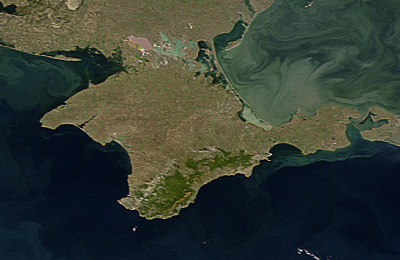By Bob Allen
Seven Baptists in Crimea were fined in May for allegedly violating more restrictive limits on public demonstrations since Russia annexed the former Ukrainian territory last year, according to Forum 18, an international news service that monitors religious freedom disputes.
The seven, along with two others, were questioned, photographed and fingerprinted after a local official broke up a religious gathering May 10 in a village in central Crimea. Baptists told Forum 18 they traveled to the area to pass on Easter greetings, sing hymns and preach to local people who gathered and wanted to hear.
 The nine – members of the Council of Churches Baptists, a group opposed to government regulation of churches as a matter of conscience — denied breaking any laws. Church members claimed in court the Easter gathering did not constitute a public meeting under terms of the demonstration law and did not disturb public order or endanger citizens. Five of the seven assessed fines have already filed an appeal.
The nine – members of the Council of Churches Baptists, a group opposed to government regulation of churches as a matter of conscience — denied breaking any laws. Church members claimed in court the Easter gathering did not constitute a public meeting under terms of the demonstration law and did not disturb public order or endanger citizens. Five of the seven assessed fines have already filed an appeal.
The case is the latest in a series of incidents involving religious minorities since Russia and Crimea signed an accession agreement on March 18, 2014. The move subjected Crimea to regulations on public demonstrations imposed by Russian President Vladimir Putin in response to protests over his return to the presidency in 2012.
According to a May 31 Newsweek commentary, Russia’s anti-extremism law has created a hard time for followers of unpopular religions like Muslims, Jehovah’s Witnesses and Roman Catholics. The new restrictions contrast sharply with religious freedom in Ukraine, which received the Crimean peninsula as a gift when both were part of the Soviet Union.
Crimea became an autonomous republic within the newly independent Ukraine in 1991, before an ongoing territorial dispute led to Russian occupation during the Ukraine’s 2014 revolution.
“Under Kiev, Crimea’s religious communities were typically left alone,” Geraldine Fagan, author of Believing in Russia: Religious Policy after Communism, said in the Newseek article. “Under Moscow, they can expect meddlesome bureaucracy at best, crippling oppression at worst.”
Under Russian law, Crimean religious organizations must re-register to operate legally in activities like producing religious literature and visiting hospitals and prisons. The deadline for re-registration was originally the end of last year, but as of May 29 just 42 of more than 1,500 Crimean religious communities which had Ukrainian state registration had completed the process.
A United Nations human-rights monitoring group called for ending the re-registration requirement, claiming it has been applied mainly to limit expression of thought and freedom of religion.
“The exercise of the rights to freedom of expression, assembly and religion is mostly limited to groups or individuals loyal to the de facto authorities,” the UN Human Rights Monitoring Mission in Ukraine said in a June 1 report on the situation in Crimea. “Administrative measures, including registration requirements, are used as control mechanisms and tools to prevent the spread of dissenting views.”
The United States Commission on International Religious Freedom recently cited “growing religious liberty concerns in Russian-occupied Crimea and Russian-separatist regions of eastern Ukraine,” reassigning Russia as a Tier 2 country for systematic and ongoing religious liberty violations not yet serious enough to merit designation as a country of “particular concern.”
Last summer the Baptist World Alliance General Council adopted a resolution voicing concern about “increased religious persecution, especially against evangelical Christians” in Crimea in eastern Ukraine.
